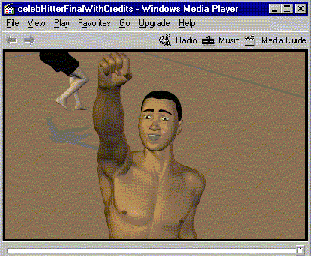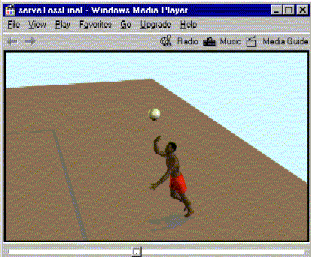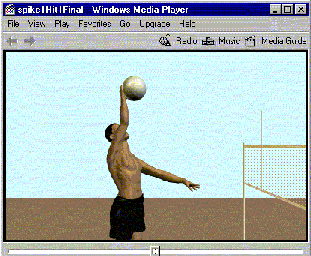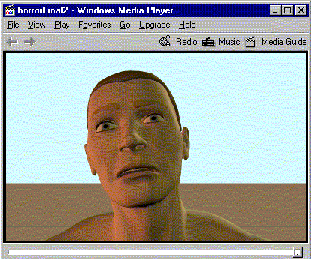Introduction |
Few people can truly appreciate
the patience and dedication that computer animators must have in order to
do what they are paid to do. Upon hearing of the animation option for the
final project of this course, I decided that I would like the opportunity
to attempt the animation of human figures, and what is better than sports
to show the movements of humans? My love for the sport of volleyball made
my choice easy, but I did not realize the lofty goals that I had set out
for myself. My first decision was to use Poser4 as the application with
which to animate the volleyball game. The focus of this project was solely
to create realistic movements of the human figures. Poser4 provides the
user with numerous human figures to choose from, so there was no need to
model the figures in this animation. Unfortunately Poser4 does not have
the capabilities to create backgrounds for the animated world and due to
the time constraints of the animation process there was no time to create
a suitable beach background. A brief attempt was made to import a
background using Bryce4 but there was difficulties encountered in trying
to animate the Bryce4 background with the human figures.
|
Action Setting |
The action begins with the serve
in a rally point set. This means that whoever wins the next point earns a
point in the score. The red team is ready to serve the ball and the black
team is ready to recieve the ball. The current score is 14 to 13 for the
black team meaning that it is now match point for the black team. The left
side player of the red team serves the ball using a jump serve, to the
left side player of the black team. The pass is made to the right side
player who sets the ball for the leftside player. The ball is set off the
net to give the left side player time to get to the set. The left side
player hits the ball down the line six-packing the right side player of
the black team. But, as fortune would have it, the right side player's
face saves the ball and allows his team mate to chase it out of bounds.
The ball is then set for the right side player of the black team who hits
the ball right into the waiting block of the red team's leftside player.
When the ball hits the ground the red team falls to the ground in defeat
while the black team begins to celebrate.
Terminology:
POWER - The left-side player or
position.
WEAK - The right-side player or position.
SIX-PACK -
Hitting an opposing player in the face.
DIG - Getting the ball back up
after an attack.
|
Characters |
There are four characters used in
this animation. For simplicity, beach volleyball was chosen over indoor
volleyball because there are only four players involved and they wear less
clothing. In this animation there are eight figures used; the four players
and their shorts. There are two teams, the red team and the black team.
 |
The left-side
player of the black team. |
 |
The right-side
player of the black team. |
 |
The left-side
player of the red team. |
 |
The right-side
player of the red
team. |
|
Movements |
In order to create the movements
of each of the players, I created every fourth frame and allowed Poser to
tween the two frames in between. This allowed for greater control of the
movements of the characters. Details such as finger and toe movements were
included to add to the realism of the action. Poser4 has predefined hand
positions which were used, such as a pointing hand or a hand making a
fist. There are also various facial expressions that are predefined that
were used to express joy, fear, and anger.
 |
The right-side
player of the black team jump-setting the ball. |
 |
The left-side
player of the black team hitting the ball down the line from
power |
 |
The right-side
player of the red team showing fear as the left-side player of the
black team jumps up to spike the ball. |
 |
The left-side
player of the black team showing an evil smile and taunting the red
team player that he just six-packed. |
 |
The right-side
player of the red team as he is six-packed. |
 |
The right-side
player of the red team as he is knocked down from the
six-pack. |
 |
The left-side
player of the red team digs the ball. |
 |
The right-side
hitter of the red team is blocked by the left-side player of the
black team. |
 |
The agony of
defeat. |
|
Background & Models |
Since the point of this project
was to animate human figures and the tedious animation process created
time constraints, only a basic background was used in this world. The
limited capabilities of Poser4 with respect to the creation of bacgrounds,
did not allow for the creation of a detailed beach scene as originally
planned. Therefore, a basic sand coloured ground was used as well as a
light blue background to represent the sky. Except for the human figures
provided by Poser4, the beach volleyball net was the only other model
used. The net is made up of three squares and four cylinders primitives.
The material of the square was altered to be semi-transparent which
serendipitously created a material similar to a net. The two other squares
manipulated to form the top and bottom tapes of the net. The remaining
primitive objects were simply resized to create the two net posts and the
two antennae.
 |
The net using
seven primitive objects found in
Poser4. |
|
Applications |
For this project, Poser4 from the
PC lab was used to animate the four players and MovieMaker from the SGI
lab was used to add sound and edit the 23 clips used in the final cut of
the animation. Poser 4 is an incredible application for animating human
movements. The pre-made figures provided by Poser are highly detailed and
allow for a level of control that make realistic movements possible. The
controls seemed strange at first, but after a period of trial and error,
one could see how the ability of any user to manipulate the smallest
details, such as the three sections of each finger, are necessary to
achieve the realism of a figure's movements.
|
Camera Work & Editing |
Extreme ambition, forced the
creation of thirty clips using different camera angles. In the final cut
of the "Match Point" animation only twenty-three of these clips were
actually used. MovieMaker is the program that was used to edit the final
cut of the animation. It is a very useful program in that it made the
"gluing" of the individual clips and the addition of sound effects very
easy. Unfortunately the compression algorithm chosen to create the final
cut didn't work as well as expected and created a file that was much too
large for any kind of practical use.
|
Production Problems |
Along with the problems
encountered with importing backgrounds from Bryce4 and the intrinsic
problems in attempting to recreate human movement, there were also
problems in compressing the final cuts of the animation. In total there
are twenty-three clips using various camera angles and sounds that make up
the final cut. These clips take many hours to render and once again, the
time constraint did not allow for the experimentation of using different
compression algorithms in the MovieMaker program in the SGI labs. In total
the final cut of this animation is about twenty-eight seconds long, but
reached a whopping 315MB. Because of the enormous size of the final cut,
there is also a much smaller rendering of the entire animation without the
movie effects, and using a static camera angle. It is also rendered in a
240 X 180 window, unlike the final cut that used a 400 X 250 window. The
larger window was used to accomodate the lateral movement of most of the
action in this animation.
|
Summary |
In working on this project, I
gained a true understanding of the type of dedication required to be a
computer animator. Almost all the production time of this animation went
into the fine tuning of the movements of all the human characters as well
as the movement of the ball.
|














